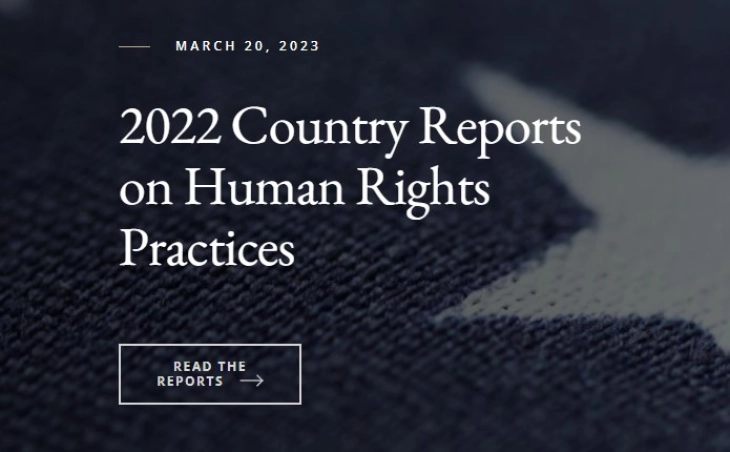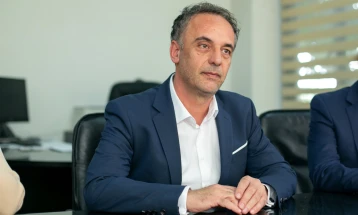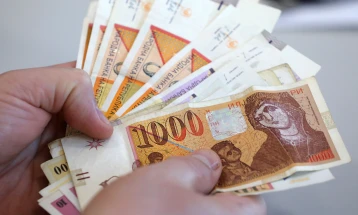U.S. State Dept: Authorities take measures to improve situation, but still cases of significant human rights issues
- Authorities in North Macedonia are taking measures to improve the human rights situation, but significant human rights issues still included credible reports of inhuman and degrading treatment and severe overcrowding in certain prison units; violence and threats of violence against journalists; serious government corruption; lack of accountability for gender-based and family violence; and crimes involving violence and threats of violence targeting lesbian, gay, bisexual, transgender, queer, or intersex persons, says the U.S. Department of State 2022 Country Report on Human Rights Practices.
- Post By Nevenka Nikolik
- 11:56, 21 March, 2023

Skopje, 21 March 2023 (MIA) - Authorities in North Macedonia are taking measures to improve the human rights situation, but significant human rights issues still included credible reports of inhuman and degrading treatment and severe overcrowding in certain prison units; violence and threats of violence against journalists; serious government corruption; lack of accountability for gender-based and family violence; and crimes involving violence and threats of violence targeting lesbian, gay, bisexual, transgender, queer, or intersex persons, says the U.S. Department of State 2022 Country Report on Human Rights Practices.
The government, reads the report, took steps to identify, investigate, prosecute, and punish officials who committed abuses or engaged in corruption. The national police maintain internal security, including migration and border enforcement, and report to the Ministry of Interior. Civilian authorities maintained effective control over the security forces.
The constitution and laws prohibit such practices, but there were reports police abused detainees and prisoners and used excessive force. The government acted to investigate and prosecute legitimate claims. The Ministry of Interior’s Professional Standards Unit (PSU) reported that during the first seven months of the year, it acted upon 30 complaints referring to use of excessive force by police officers. The unit deemed 16 of the complaints unfounded, dismissed 11 for insufficient evidence, and upheld three.
The U.S. Department of States notes harsh prison conditions due to severe overcrowding, food shortages, and inadequate sanitary conditions. Overcrowding remained an issue, particularly in some wards of the Idrizovo prison, the country’s largest facility. Some cells at Idrizovo had 16 to 19 inmates. The ombudsman report noted poor conditions in most of the other prisons, and overall lack of funding and understaffing of the corrections system.
Juveniles faced a lack of educational and job skills training as well as overmedication, while there was inadequate accommodation of juvenile girls ages 14 to 16. Data showed as many as 58 percent of incarcerated juveniles were diagnosed with mental health issues.
A report from the European Committee for Prevention of Torture and Inhuman or Degrading Treatment or Punishment (CPT), mentioned by the U.S. State Department's report, noted poor management, endemic corruption among prison staff, interprisoner violence, inadequate health care, and poor living conditions (particularly at Idrizovo). There were no reports of political prisoners or detainees.
As regards judiciary and access to justice, the report states that the law prohibits arbitrary arrest and detention and provides for the right of any person to challenge the lawfulness of his or her arrest or detention in court, as well as to receive compensation for unlawful detention. The government generally observed these requirements.
The constitution provides for autonomous and independent courts, but the government did not always respect judicial independence and impartiality. Instances of judicial misconduct, undue political and business pressure on judges, protracted justice, as well as inadequate funding and staffing of the judiciary continued to hamper court effectiveness and affected public confidence in the rule of law.

According to the Judicial Council, extremely low public confidence in the judiciary was due to significant judicial corruption; judges intentionally delaying trials or appellate review to enable the statute of limitations to take effect, especially in high-profile cases involving wealthy and influential businessmen or politicians; judges perceived as collaborating with defense attorneys for bribes or trading with influence; and conflict of interest combined with nepotism. The council said prosecutors showed professional misconduct and corruption via lax prosecutions and intentional over- or undercharging not supported by evidence.
The courts operated with significant delays, especially in high-profile corruption and multidefendant cases. The judiciary and the Public Prosecutor’s Office remained underfunded and understaffed, despite a slight increase in funding levels. As of August 30, the Supreme Court operated with only 15 of 28 justices, reads the report.
As regards freedom of expression and media, the report notes that the constitution provides for freedom of expression, including for members of the press and other media, and the government generally respected this right. According to the Association of Journalists of (North) Macedonia (AJM); however, the government demonstrated a lack of capacity to effectively sanction violations of journalists’ rights and protect their safety. In November the Skopje Public Prosecutor’s Office (PPO) confirmed it had appointed a prosecutor to serve as a contact person in connection with cases involving journalists and monitor cases in which journalists appear as the damaged parties, witnesses, or offenders.
The State Department points out that the law prohibits speech inciting national, religious, or ethnic hatred and provides penalties for violations. Individuals may criticize the government publicly or privately. On November 17, parliament unanimously adopted the Law on Civil Liability for Insult and Defamation, which introduced significant reduction to fines for media outlets, and journalists in defamation lawsuits.
Media outlets and reporting, reads the report, continued to be largely divided along political lines, but the number of independent media actively expressing a variety of views without overt restrictions continued to increase. Laws restricting speech inciting national, religious, or ethnic hatred also cover print and broadcast media, publication of books, and online newspapers and journals. The Commission for Prevention and Protection Against Discrimination and CSOs a reported significant surge in “hate speech,” including in social and some traditional media.
Central government advertising on commercial channels is banned, but local government advertising is not. The state continued to subsidize print media. In December 2021, following an open call, the government allocated approximately 33,000,00 denar ($570,000) to 11 print media outlets to cover part of the 2021 printing and distribution expenses.
The Media Ethics Council continued to work on promoting self-regulation. As of August 16, the council had received 48 complaints of unethical reporting and fake news, which was 50 percent lower than the number received in the same period in 2021. Nearly 63 percent of the complaints were related to unethical reporting, with approximately 17 percent for editorializing and 6 percent for hate speech, the report reads among other.
The report notes that seasoned journalists and media leaders expressed concerns regarding intensifying Russian malign influence and disinformation, primarily through the growing presence of Serbian media in the country.
The State Department says there were cases of alleged threats and harassment against journalists during the year. As of August 15, the AJM had received eight complaints from journalists, including police summoning journalists to “informative interviews,” preventing journalists from carrying out their duties, threats and insults received while on duty, and inappropriate conduct of central and local government officials or political party members.
According to the Platform for Investigative Journalism and Analytics September survey, 80 percent of surveyed women journalists were often the target of online harassment, including threats and online bullying. In most instances, the harassment was related to stories published by those journalists.
In terms of Internet freedom, the report notes that the government did not restrict or disrupt access to the internet or censor online content, and there were no credible reports the government monitored private online communications without appropriate legal authority.
The State Department's report on human rights practices in North Macedonia says the constitution and the law provide for the freedoms of peaceful assembly and association, and the government generally respected these rights.
As regards freedom to participate in the political process, the report says that the law provides citizens the ability to choose their government in free and fair periodic elections held by secret ballot and based on universal and equal suffrage.
In addition, regarding freedom of association and the right to collective bargaining, the State Department's report says the law provides the right of workers to form and join independent unions, bargain collectively, and conduct legal strikes, but the government and employers did not always respect freedom of association, the right to strike, and the right to collective bargaining.
Photo: State Department







